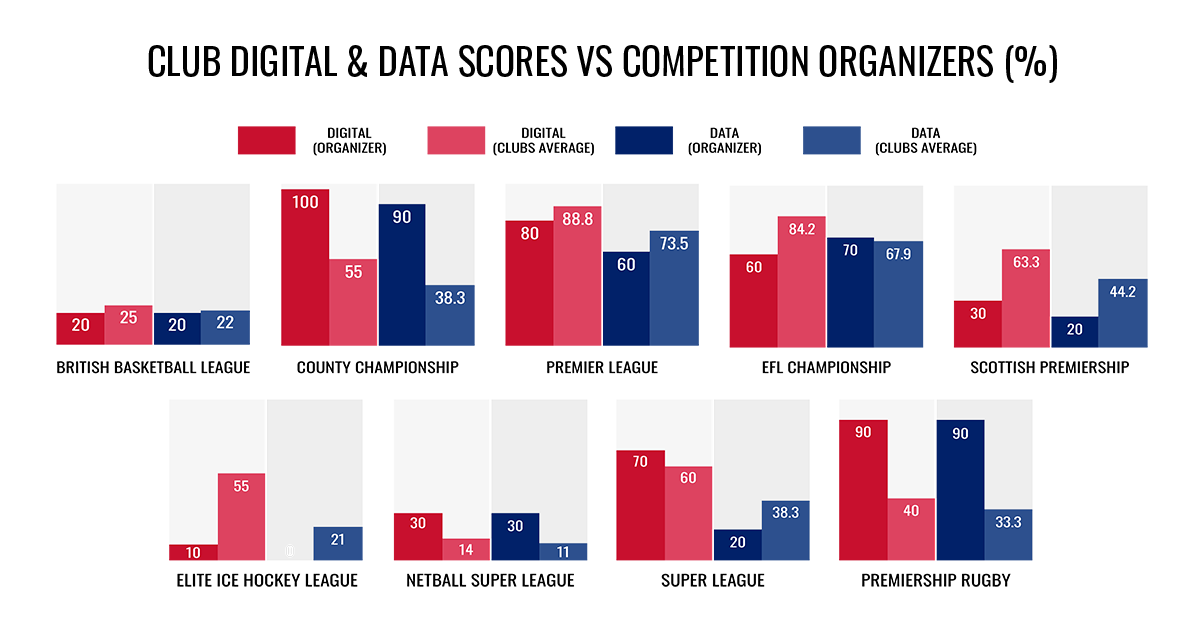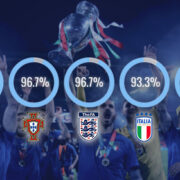Understanding the fan and customizing business models based on their individual interests and behaviors grants professional clubs, leagues, and competition bodies a competitive edge in an increasingly saturated market, at a time when digital transformation is becoming table stakes in sports business.
Fan-data ownership and the centralization of user information are essential for modern sports organizations and rights holders to generate sustainable commercial growth.
Our recently published UK market report examines the digital and data maturity levels of 133 elite clubs across ten professional leagues, as well as 18 major competition organizers. Every organization demonstrates the potential for growing their individual brands and sporting disciplines through the power of digital transformation as well as a willingness for expanding their digital footprint to engage with fans worldwide.
According to our findings, emerging men’s and women’s competitions highlight an opportunity for national governing bodies and competition organizers to optimize the fan experience within their multi-club and multi-format sporting ecosystems by consolidating and cross-pollinating their respective digital and data touchpoints.
However, whereas many of English football’s top-flight Premier League clubs set benchmarks for digital transformation, other UK elite clubs and competition organizers are still finding their bearings in the digital landscape and have yet to establish a clear strategy for developing a diverse direct-to-consumer (D2C) portfolio and harnessing fan data to inform business decisions.
Among the most digitally diverse sports bodies in the UK, the England and Wales Cricket Board (ECB), the organizing body for multiple first-class cricket competitions including the County Championship, Twenty20 Vitality Blast, and The Hundred, offers a diverse range of digital products to its fans, lending itself to a high data maturity and a broad social media presence across the entire ECB ecosystem.
In addition to the ECB – the All England Lawn Tennis & Croquet Club (AELTC), organizer of the Wimbledon grand slam tennis championships, The Football Association (The FA), the organizer of the top-flight Women’s Super League (WSL) and domestic FA Cup competitions, and The Royal & Ancient Golf Club (The R&A), the organizer of the Open Championship, also receive maximum scores for their digital portfolios.
Overall, the organizing bodies assessed – collectively – own a high website (100 percent) and mobile app (72.2 percent) ownership, though have room to grow their data-collection capabilities across ticketing (50 percent), OTT/streaming (44.4 percent) and ecommerce (27.8 percent). Meanwhile, as few as 44.4 percent utilize a single sign-on (SSO) across every one of their respective data touchpoints.
Download the Digital Transformation Regional Market Report 2024 | UK to gain full access to the digital and data assessments of 133 elite clubs and 18 major events organizers.
UK CLUBS & COMPETITION ORGANIZERS DEMONSTRATE DIGITAL & DATA DISPARITIES
Outside the UK’s major club competitions, the market hosts several top-tier sporting occasions watched around the world, including the Wimbledon grand slam tennis championships, the British Grand Prix Formula One motor racing event held at Silverstone race track, the Open Championship golf event, multiple international horse racing events including the Grand National, as well as the World Snooker Championships and World Darts Championships.
Despite a plethora of sporting occasions, the digital and data maturity of organizing bodies ranges from the echelons of the AELTC and the R&A, to sleeping giants such as The Jockey Club, Motorsport UK, the Professional Darts Corporation (PDC), and the World Snooker Tour (WST). Although each sports organizer assessed has taken positive strides on their digital transformation journeys, they all have the capacity to enhance their data-collect capabilities and overall fan intelligence.
The FA and Premiership Rugby, the organizing body for top-flight English men’s rugby union, are the only properties that own the same level of data maturity as the ECB (90 percent), while both collect first-party fan data across all digital platforms except for ecommerce. Premiership Rugby is setting a benchmark for its club teams, which collectively score a lower average for digital products (40 percent) and data collection (33.3 percent) compared to the overall UK market averages (see the Club-League Averages table below).
In contrast, the Premier League’s average club scores for digital products (88.8 percent) and data collection (73.5 percent) land much higher than the league body itself, demonstrating that even the UK’s most popular and digitally diverse competitions can take further strides in their digital transformation journeys. This should give food for thought among the market’s emerging competitions and how a collaborative approach can enhance the digital and data maturity of the competition bodies and their stakeholder clubs, serving a mutual benefit for their sport’s digital growth potential.
WHAT’S N3XT?
N3XT Sports research is carried out with the sole purpose of highlighting the opportunities and benchmarks for digital transformation throughout the sports industry. While the UK sports market is heaped in tradition and recognized globally, our findings show that, no matter the popularity of a club, league, or federation among its core audience, there exists disparities between their levels of digital and data maturity throughout the region.
It’s important to note that no sports organization is entirely alike and there will always be nuances in their business strategies and how they engage with fans. Digital transformation acts as a foundation for all sports properties to amplify their commercial efforts by centralizing data and information while simplifying internal workflows.
While the UK sports market remains an appealing market for international sponsorship and capital investment, to reach its full potential, organizations must first demonstrate a proficient understanding of how their digital ecosystems are connected, how they serve the individual fan, and their capacity for growth.
Our team at N3XT Sports works tirelessly to develop and implement data and digital transformation strategies across a multitude of sports properties at federation level, competition level, and club level. To find out more about how N3XT Sports can serve your organization, fill out the form below, and we’ll be in touch. Our goal is to drive the digitalization of the sports industry and our clients.





